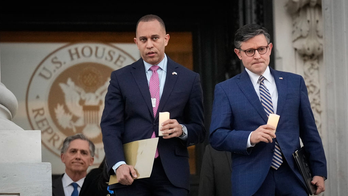A trade agreement that was hammered out two years ago is languishing in Congress, and its supporters are warning that the United States could lose its closest ally in Latin America if it doesn't pass.
For 10 years, despite its troubled history of civil war and narcoterrorism, Colombia has been the staunchest Latin American supporter of America's War on Drugs. It has participated in programs such as the manual eradication and aerial spraying of coca plants, and it has seen a dramatic reduction in narcotics production and drug trafficking.
In February 2007, the United States and Colombia finalized the terms of the Colombian Free Trade Agreement, which would eliminate nearly all trade tariffs between the countries.
For Colombia, the agreement would make permanent an arrangement whereby nearly 91 percent of Colombian goods come into the U.S. duty-free.
For the U.S., it means eliminating tariffs -- sometimes as high as 35 percent -- on the majority of U.S. exports to Colombia. U.S. farm exports -- such as high-quality beef, cotton, wheat and soybeans -- would be duty-free immediately as would textiles and clothing. Over the course of 10 years, all remaining tariffs would be eliminated.
Proponents of the agreement say this would be a huge boon for the U.S., as goods exported to Colombia totaled $8.6 billion in 2007 alone.
"This agreement is important because it also opens up Colombia's economy to American products," said Amb. Roger F. Noriega, of the American Enterprise Institute. "The agreement is a two-way street; we stand to benefit from this agreement as well."
But President-elect Barack Obama and Democrats in Congress have publicly denounced CFTA, because it does not address the issue of violence against unions in Colombia. During the third presidential debate with John McCain on Oct. 15, Obama argued: "The history in Colombia right now is that labor leaders have been targeted for assassination on a fairly consistent basis, and there have not been prosecutions."
U.S. labor unions, which according to The Center for Responsive Politics spent tens of millions of dollars in support of Obama's campaign, have long fought against CFTA and other trade agreements that do not include protections for workers.
"There's an extraordinary level of violence against trade unionists in Colombia, and there's a high level of impunity for that level of violence, and that stretches out over several decades," said Thea Lee, Policy Director of the AFL-CIO.
Colombian paramilitary groups have admitted to targeting trade unionists for assassination. According to the National Labor School (ENS) in Colombia, 2,283 trade unionists have been murdered since 1991, and at least 38 in 2007 alone.
Union leaders say they will support CFTA only if the Colombian government agrees to three main provisions: stopping violence on the ground against union members; establishing a more effective way of bringing justice to the perpetrators of the violence and reforming labor laws to make them compliant with International Labor Organization standards.
But CFTA supporters warn that America will lose a close ally if the bill dies in Congress.
"The current Colombian government is certainly a friend of the United States, and so are the Colombian people. They recognize that we've been a good partner," said Noriega. "But quite frankly, after all the sacrifices they've made, if we abandon them to the tender mercies of the narcoguerrillas, there's going to be a certain bitterness, and it will send a message that we are not a reliable partner to the rest of our neighbors in Latin America."
"This is a big opportunity for the incoming Obama administration to both repair and rebuild a relationship that's crucial," said Carol Wise, Professor of International Relations at the University of Southern California. "Like it or not, the United States has very strong trade and investment ties in the Western Hemisphere."
Wise said that Colombia's friendship is even more significant when compared to anti-U.S. sentiment among its neighbors. Bolivia has just given the U.S. Drug Enforcement Administration three months to leave the country; Venezuela has all but ended any U.S. drug eradication operations; and Ecuador will be closing a major U.S. air base at Manta used for anti-drug missions.
Noriega and other Latin American watchers say that if the U.S. does not ratify the CFTA, Colombia will be forced to turn elsewhere for economic support. Two possible options are Russia and Venezuela, both of which have opposed U.S. foreign policy in the region.




